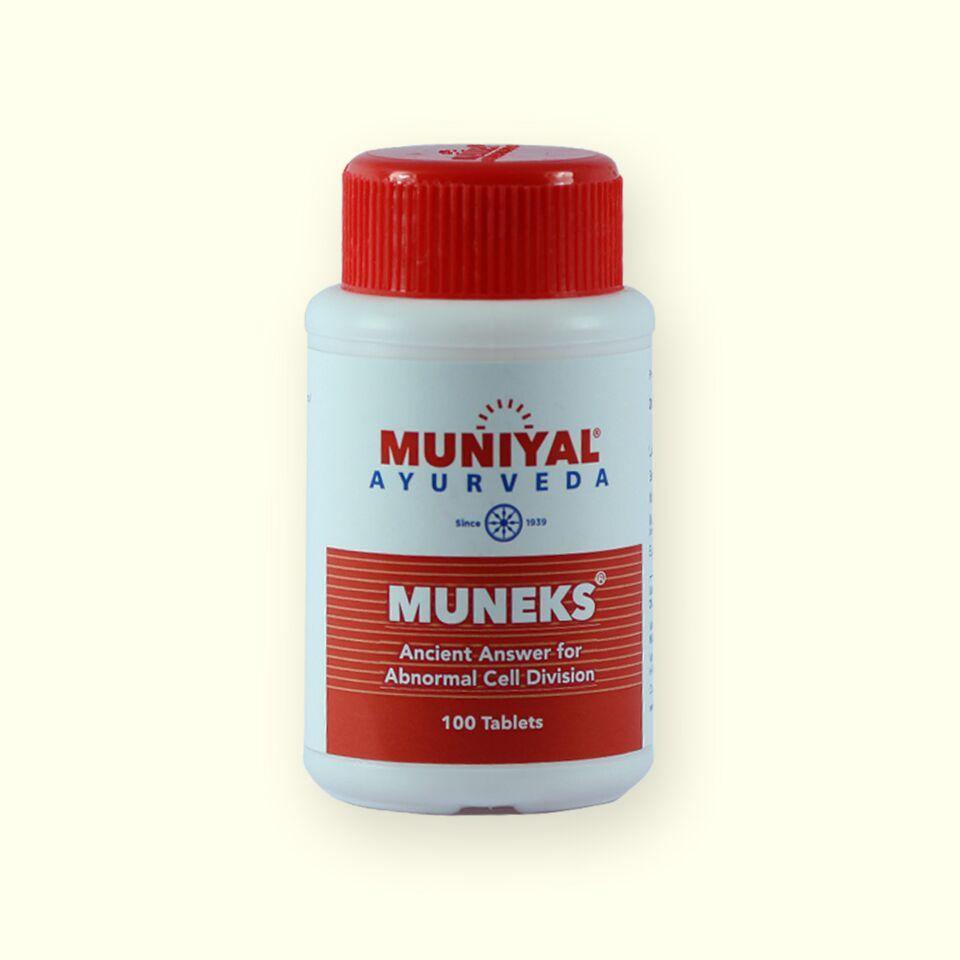
| Charges in INR |
Rs.600 |
| Add to Cart | |
Note: You will be directed to our eCommerce portal on click [muniyalayurveda.in]
Muneks Tablets – An Anti-cancer Product
- Ancient Answer for Abnormal Cell Division.
- Muneks has anabolic and cyto-protective action, protecting vital organs like liver and kidneys.
- Promotes the awakening of cellular intelligence and thereby controls the cancer growth progression.
- Reduces toxic effects of chemotherapy and aids fast recovery.
- Anxiolytic, anti-stress activities along with anti-inflammatory and anti-ulcer activities contribute to the overall effect.
- Studies have proved that Muneks has significant anti-tumor property as it stops and regresses tumor growth and is non-toxic even in high dosage.
- Experimental studies have proved that Muneks has effective anti-tumor activity against Dalton Cell lymphoma.
- Clinical studies have indicated Muneks as effective in preventing metastasis.
- Muneks enhances natural killer cell activity, tumor necrosing factors and antibody dependent cyto-toxicity.
- Muneks enhances body immunity.
- Prevents tissue damage and acts as a free radical scavenger.
- Stops the progress of tumor growth and also helps to regress the tumor growth.
- In addition to this it also improves general health of the individual.
Director of United States Patent and Trademark Office has granted 2 US patents for Muneks.
This is a very potent formulation formed by combining a number of herbo-mineral drugs and developed after extensive research work. Some of the ingredients in the formulation showed very good immuno-modulatory activity. They enhance natural killer cell activity and also Tumor Nursing factors and anti-body dependent cellular cyto-toxicity (ADCC) syngeneric BACB/C mice, bearing tumor.
Some ingredients have anabolic and cyto-protective activity, proving their action in protecting the vital organs like liver and the kidneys. Other ingredients showed antioxidant effects where they acted as potent inhibitors of lipid peroxide formation and scavenger of hydroxyl and superoxide radicals in vitro. Anxiolytic, anti-stress activities of certain ingredients along with anti inflammatory and anti-ulcer activities contribute to the overall effect of the formulation.
MUNEKS – Scientific Findings
- Acute toxicity: Acute toxicity studies were conducted in rodents according to organization of economic cooperation and development 423 (Acute class method). The product was found to be safe and nontoxic even at very high doses. It was non-lethal beyond 5,000 mg/kgbw and lethal at 40 gm/kgbw when administered by oral route.
- Invivo Evaluation of anti-tumor activity: Screening of anti-cancer efficacy against Dalton Ascitic Lymphoma was conducted in animal studies (rodents). Test drug treatment was started after the 9th day of tumor inoculation. Test drug was reported to have anti-tumor property.
- In-vitro cytotoxicity studies on selected cancer cell lines: In-vitro cytotoxicity of test drug was tested by MTT on A-549 (Human lung carcinoma), HeLa (Human cervix adenocarcinoma), SKOV3 (Human ovarian cancer), PANC-1 (Human pancreas carcinoma), Hep-G2 (Human hepatoma adenocarcinoma), AGS (Human stomach gastric adenocarcinoma), U-937 (Human lymphoma carcinoma) and EB-3 (Human burkitt lymphoma) cell lines. Test drug exhibited cytotoxic activity.
- Gene expression, DNA fragmentation and apoptosis activity by cell cycle analysis against A-549 (Human lung carcinoma) cell lines treated with test drug:-
- DNA fragmentation pattern of DNA of lung cancer cells (A-549) by test drug: Apoptosis or programmed cell death plays a critical role in development and homeostasis of normal tissue. Defects in apoptosis can cause cancer as it causes cells to survive over intended lifespan. One of the distinctive features of apoptosis is the fragmentation of DNA into multimers of approximately 200 base pairs due to activation of endonuclease. Cleavage of chromosomal DNA into oligonuclesomal size fragments is a biochemical hallmark of apoptosis. DNA fragmentation was detected when A-549 cells were exposed to test drug.
- Gene expression studies of BCL-2, Caspase-3 and P-53 in A-549 cells treated with test drug: P53, Bcl2 and Caspase 3 were estimated for test drug by gene expression method (RNA isolation, cNDA synthesis, RT-PCR), where the level of expression of P53, Bcl2 and Caspase 3 gene (fold regulation) on A-549 Human Lung Carcinoma cells was determined with respect to untreated A-549. Significant increase in the level of P-53 and BCL-2 was observed in cancer cells treated with test drug. Test drug showed upregulation of all 3 gene expressions.
- Cell cycle study of test drug against A-549 cell line: In flow cytometric analysis of cell cycle of A-549 cell line exposed to test drug resulted in significant increase of G2/M fraction by about 1.7 times when compared to untreated cells (10,000 singlet cells were selected for analysis).
Our results taken together indicated that test drug is a potential agent for anti-cancer drug development.
Principal Ingredients:
• Kanchanara (Bauhinia variegate)
• Shuddha Guggulu (Commiphora mukul)
• Ashwagandha (Withania somnifera)
DOSAGE: 2 Tablets Twice Daily
Muneks does not contain any additives, not even to form the tablet (non-coated, non-capsulated).
